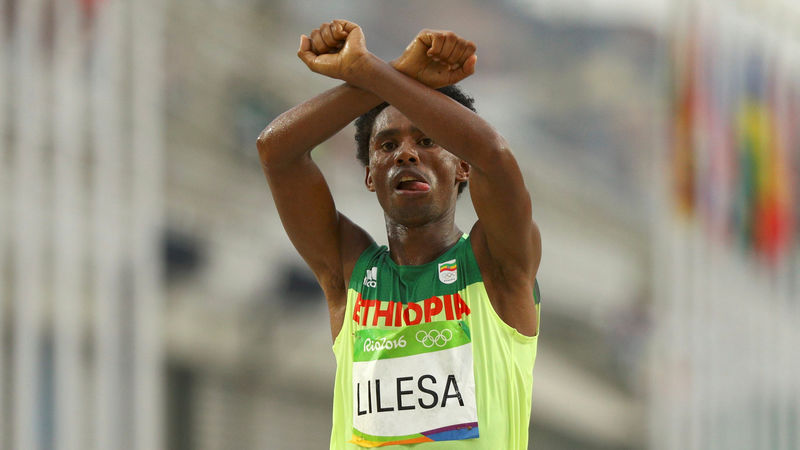By Sally Hayden
LONDON (Thomson Reuters Foundation) - Ethiopian silver medallist Feyisa Lilesa, who did not return home after staging a protest against his government at the Rio Olympics, said on Thursday he feared for his life if he went back and vowed to keep up his fight for land rights.
Lilesa attracted global attention as he crossed the finish line in the marathon on Sunday and raised his arms above his head in an "X", a sign of protest against the Ethiopian government's treatment of his people, the ethnic Oromo.
Ethiopia's Oromiya region, home to more than 25 million Oromos, has been riven by violent unrest over land rights and allegations of human rights violations since last November.
Conflict over Oromo land began more than 100 years ago and the marginalization of his people is equally long standing, Lilesa said.
He fears his life would be at risk if he returned, despite public assurances by the government that he would not be punished for his protest.
"I heard that and found it funny," Lilesa told the Thomson Reuters Foundation by Skype from Rio, where he has been staying since Monday when his team mates returned to Ethiopia
"They kill and they don't tell the world they kill, they jail and they don't tell anybody, so how can I believe that?" he said.
Government officials did not reply to the Thomson Reuters Foundation's request for comment.
Lilesa said he had not been contacted directly by any government official but believed that once he made his protest gesture, he could not return home.
"[I knew] I would be jailed or killed (and) if not, I would [never be allowed] out of that country and allowed to participate in any international competition or race at all. I am quite sure those things would happen to me."
Lilesa said he had been given temporary leave to stay by the Brazilian authorities but had not decided yet where he was going to seek asylum.
BATTLE FOR LAND
The 26-year-old champion runner said he decided to make the protest sign when he was chosen earlier this year to represent Ethiopia at the Olympics.
Knowing the international media would be in Rio, he said he realised he could use the moment to explain the plight of his people to a global audience.
"I was going to represent all the people ... I knew a lot of people were watching the TV, I wanted to show solidarity, that I was thinking of them, that my heart was with them," he said.
Demonstrations against a government plan to allocate farmland in Oromiya to the capital Addis Ababa for development, which would potentially displace farmers, have been violently suppressed by security forces, according to activists and witnesses.
"When the city expands the [authorities] would take away their land and build hotels or buildings, the owners of the land would then become guards (for) someone else's property ... that's what the Oromo people have had to deal with again and again," Lilesa said.
Unrest spread to other parts of the country and human rights organisations estimate as many as 500 demonstrators have been killed over the past nine months.
The government disputes the death toll and says the protests are being staged illegally, stoked by rebel groups and oveseas-based dissidents.
Lilesa said the situation had impacted on his training as he was constantly worried about members of his extended family who were jailed in the wake of the protests.

"I have been suffering a lot of things. My family and relatives have been jailed ... I can't count the number who were in prison," he said, calling on the Ethiopian government to adhere to democratic processes, respect land rights and release all political prisoners.